- Details
(Provided by IBF)
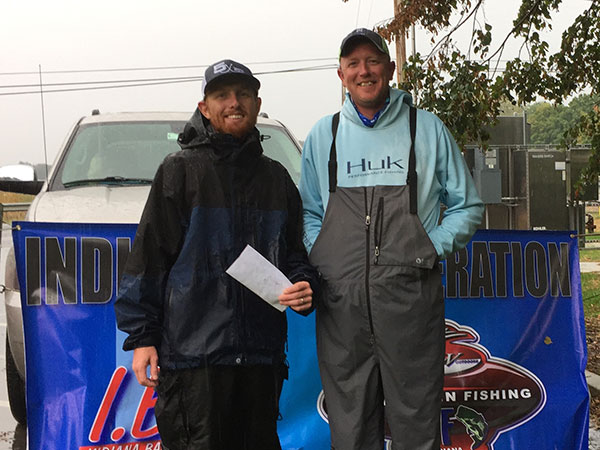 Steven Neale (Roanoke, Ind.) and George Crooks (Indianapolis)
Steven Neale (Roanoke, Ind.) and George Crooks (Indianapolis)
The Indiana Bass Masters team of Steven Neale (Roanoke, Ind.) and George Crooks (Indianapolis) took home top honors in the Indiana Bass Federation Zone 1 Tournament of Champions on Lake Wawasee last weekend.
The contest featured the two highest finishing anglers from each of the 23 IBF clubs in the northern part of the state.
The winners won $485 with five bass weighing 10.11 pounds. They also took Big Bass Honors ($80) with a 3.79-pound largemouth that earned them another $80.
South Bend’s St. Joe Valley Bass Masters’ Fred Zimmerman and Bryce Amber (Granger) took second ($326) with a limit weighing 7.90 pounds.
Andrew Quillen (Fort Wayne) and Tom Stark (Angola) representing the Angola Bass Masters were third ($277) with 7.33 pounds, edging out Art Kerns (Wheatfield) and John Stepp (Michigan City) by only .01 of a pound.
A total of 45 fish were brought to the scales weighing 71.12 pounds. All were released alive.
- Details
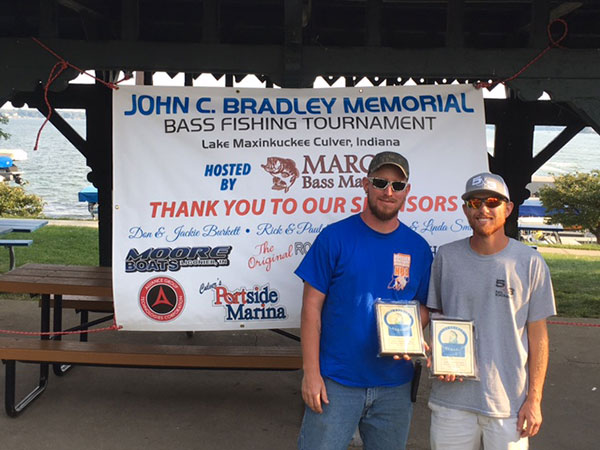 Quillen, Crim Win Bradley Benefit on Maxinkuckee
Quillen, Crim Win Bradley Benefit on Maxinkuckee
Andrew Quillen and Nick Crim caught 11.35 pounds at Lake Maxinkuckee (Culver, Ind.) to win the annual John C. Bradley Memorial Bass Tournament last week.
The winners ($475) used craw baits to catch a limit from an isolated weed patch on a flat. When the wind diminished around midday, they drifted to the end of a point where they found another weed patch and culled two keepers with drop-shot rigs. They caught a dozen or more other keepers but couldn’t upgrade. The duo used Strike King Finesse worms, Zoom Craws and a Strike King Rage Craw.
The event, hosted by Marco Bass Masters of Plymouth, attracted 45 teams and raised more than $1,400 that went to the Boys & Girls Club of Marshall County and the Marshall County Council on Aging.
Matt Hoffer and Ryan Gray were second ($300) with 11.20 pounds while Dave Morrow and Hunter Patton were third ($225) with 11.03 pounds.
Other cash winners were Andy Buss and Jim Wheeler, 10.93 pounds, $150; Cole Schroeder and Alex Petersen, 10.51 pounds, $125; Bill Whittaker and Doug Klapp, 10.39 pounds; Gerald Magee and Chip Harrison, 10.38 pounds, $75; Bob and Brandon Hensley, 10.37 pounds, $60; and Marcus Courtney and Rick Patton, 10.26 pounds, $50.
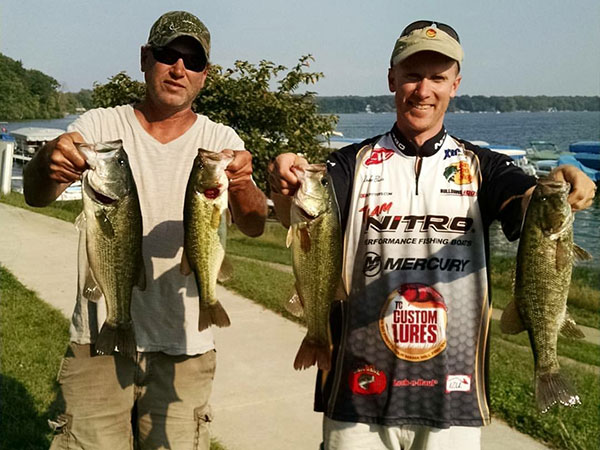 Andy Buss and Jim Wheeler caught the biggest bass, a 3.57 pounder.
Andy Buss and Jim Wheeler caught the biggest bass, a 3.57 pounder.
Andy Buss and Jim Wheeler caught the biggest bass, a 3.57 pounder that won them $337.50. Second biggest bass ($112.50) was won by Greg Anderson and Lance Roby with a 3.17-pound fish.
The $100 Janice Hite Memorial Award, given to the top female participant/team, was and won by Samantha and Jim Hippensteel.
John Bradley was an avid bass fisherman and an active member of the Marco Bass Masters for over 30 years. He served the Plymouth community as a Prudential Insurance agent for 30 years before retiring and passed away May 25, 2013.
- Details
The winners had 10 pounds, 14 ounces. They won $210 plus $250 in the Re/Max Ability plus award and a $100 bonus pot for having the biggest bass, a 2.37 pounder. They also garnered the $50 big bass pot from Double Dís Lawn Service.
Dave Dowden (Edwardsburg) and Jeremy Cooper (Osceola) were second ($100) with 9.58 pounds and won bonus pots from Re/Max Ability Plus ($100) and Re/Max Icon Group ($50).
Tim Lusher (Elkhart) and Chris Hubbard (Osceola) were third ($50) with 9.40 pounds that also got them a Re/Max Ability Plus bonus ($150).
Chuck Sidwell (Elkhart) and Paris Bryan (Elkhart) were fourth ($40) with 8.80 pounds. They also had second big bass honors ($40) with a 2.26 fish and got the Re/Max Icon Group $50 bonus.
- Details
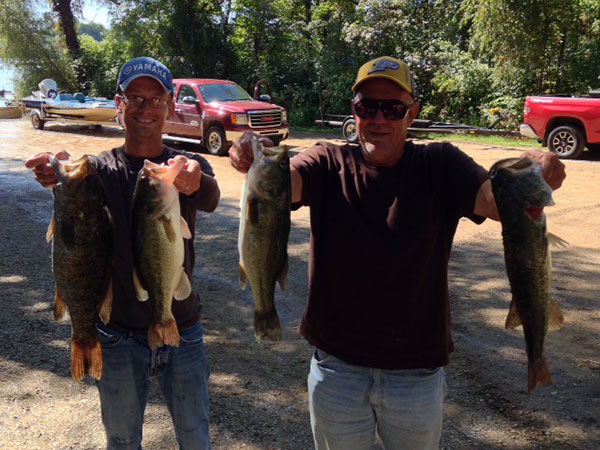 Gipson and Gramps Win at Magician with Big Smallie
Gipson and Gramps Win at Magician with Big Smallie
John Gipson (Battle Ground, Ind.) and his grandfather Jim Weaver (Dowagiac) won the Clear H2o Big Bass Challenge on Magician with 15 pounds, 10 ounces that included big bass of the event, a 3-13 smallmouth.
The winners ($280) caught all of their fish on a flick shake worm in 4-8 feet.
Justin Hahaj (Bridgman) and Herman Barry (Watervliet) were second ($180) with 13-11 caught on drop-shot rigs in 10 feet.
Mark and Sue Michael (Sturgis) were third ($100) with 8-9 caught on various baits fished on a flat.
- Details
Ron and Debbie Desimone (Elkhart) had four smallmouth and one largemouth on Eagle Lake to win the Casting Couples season finale held on Juno and Eagle lakesThe winners caught 9.77 pounds total weight from a sandy flat in Eagle. They won $230.
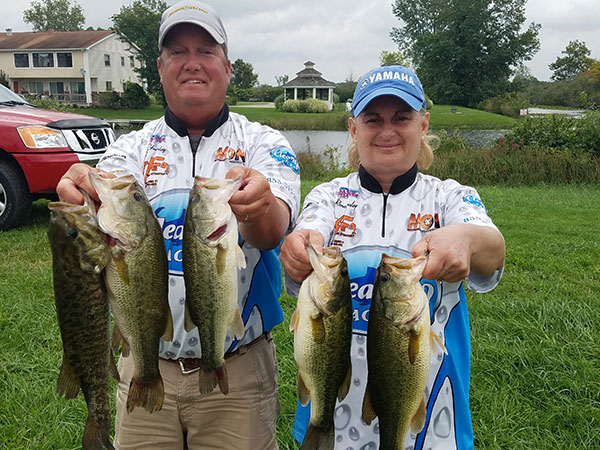 Brian and Renee Hensley
Brian and Renee Hensley
Brian and Renee Hensley (Edwardsburg) finished second ($120) with 9.69 pounds. They worked weeds in 7 to 10 feet of water in Eagle. The couple also won the Anglers of Year title.




